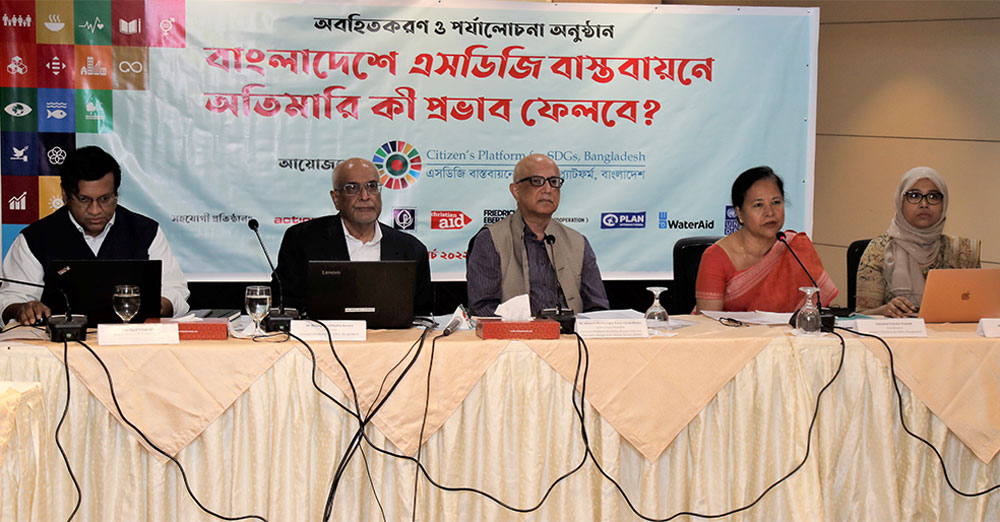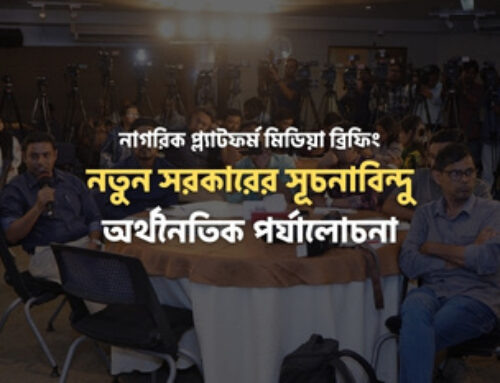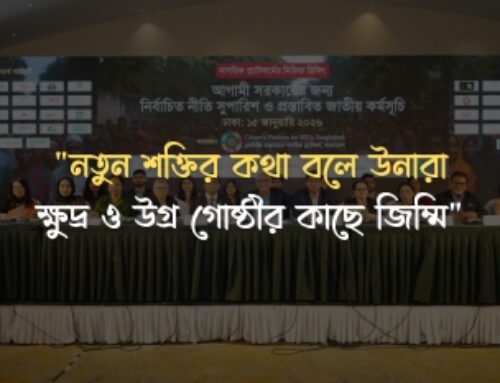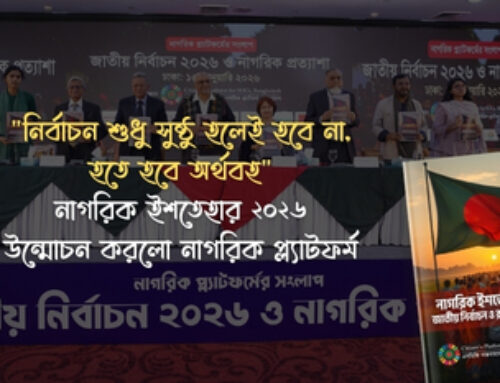
As the COVID-19 is superimposed on pre-existing disparities, the repercussions for SDGs have been channelled to vulnerable groups, exposing them to a disproportionate brunt and risking the core principle of the agenda of leaving no one behind. COVID-19 has affected almost all SDG indicators. Amongst all the SDGs, economic and social related development targets have been the most affected. COVID-19 had a more intensified impact on poverty, inequality and employment related areas. Education, child marriage and violence against women will continue to impact in the medium term. Tracking mechanisms to capture the pandemic impact on SDGs are severely affected due to the dearth of data. There is hardly any up-to-date data to capture the impact of COVID-19 on SDG targets.
In this context, a Briefing and Review Session titled “What Impact Will Pandemic Have on SDGs Delivery in Bangladesh?” was organised by the Citizen’s Platform for SDGs, Bangladesh on Thursday, 10 March 2022, at BRAC Centre Inn, Dhaka, to discuss the aforesaid issues and propose tangible policy measures, particularly in view of the upcoming national budget of FY2022-23.
Dr Debapriya Bhattacharya, Convenor, Citizen’s Platform for SDGs, Bangladesh and Distinguished Fellow, CPD, in his keynote presentation, shared the findings of a study conducted by the Citizen’s Platform, which assessed the impact of COVID-19 on the delivery of SDGs in Bangladesh from the perspectives of the disadvantaged population groups.
The immediate focus must be on protecting the purchasing power of the disadvantaged people by controlling the cost of basic living and enhancing income opportunities. The government should immediately reduce duties, tariffs and taxes to make prices of essentials more affordable and provide access to basic commodities at “fair prices” by expanding open market sales (OMS) operations of TCB. The government should expand public works, social protection programmes and food assistance and increase the tax rebates for job creation. Public resources will need to be redirected for subsidy to protect prices of electricity, fuel, food and fertiliser. Given the resource constraint, the government will need to use public money under ADP more efficiently and accelerate investment in the rural public health system and address education loss.

The upcoming national budget of FY2022-23 should be designed in the context of following recent developments which threaten to raise vulnerabilities of the disadvantaged. Overall policy approach should be towards using SDG as a framework for post-pandemic recovery by prioritising public expenditure on education and health in view of COVID losses. Additionally, the SDG tracker should be updated urgently.
Dr Ahmed Mushtaque Raza Chowdhury, Core Group Member, Citizen’s Platform for SDGs, Bangladesh and Convener, Bangladesh Health Watch (BHW) chaired the session. In his remarks, he pointed out that after every catastrophe, the countries can also use the learnings as an opportunity to implement reform to address the weaknesses in the prevailing system. We also have to use the lessons of current crisis to build forward better.
Professor Mustafizur Rahman, Core Group Member, Citizen’s Platform for SDGs, Bangladesh and Distinguished Fellow, Centre for Policy Dialogue (CPD) discussed on Social Protection and has demanded to expand social safety net adequately in urban and peri-urban areas. To this end, lack of data and information is obstructing government to reach the people in need.
Mr Zakir Hossain, Chief Executive, Nagorik Uddyog on Informal Sector, stressed that the high prices of essential commodities are not adequately addressed by the policy makers. He also gave importance to conduct an independent mid term review of SDG implication as we are crossing the mid-point of 2030 timeline.
Poverty effects women across all dimensions, especially those working in the informal sector hence the upcoming budget should be focused on allocating more finance for social safety net. Dr Maleka Banu, General Secretary, Bangladesh Mahila Parishad on Women stressed that the pandemic increased inequality, including gender inequality and lack of good governance has further constrained addressing this issue.

Mr Reefat Bin Sattar, Director – Programme Development and Quality, Save the Children in Bangladesh on Children highlighted that the pandemic may have affected all, but those with better resilience were able to cope better. While fighting with COVID-19, the health sector faced difficulties to deal with priorities such as maternal and child care. He also stressed that being absent from school during the pandemic has adversely affected the mental health of children, so this requires special attention.
Budgetary allocations for environment and climate have declined in recent years, said Ms Syeda Rizwana Hasan, Chief Executive, Bangladesh Environmental Lawyers Association (BELA) on Climate Effect. She highlighted that, Apparently, COVID-19 has deprioritised environmental issues for government which Bangladesh, as a climate vulnerable country cannot afford. Adding with her, Ms Hasin Jahan, Country Director, WaterAid Bangladesh on Water & Sanitation, mentioned that Water, Sanitation and Hygiene (WASH) was key in countering COVID-19. Unfortunately, budget allocations have been declined for WASH. In Bangladesh, budget for WASH is highly urban-biased. It is critical to give more importance to rural areas. Additionally, budget tracking for WASH is not possible due to lack of separate budget code.
Dr Mostafizur Rahaman, Program Manager, Campaign for Popular Education (CAMPE) on Education, recalled the fact that the poorest and most disadvantaged children were deprived from online based education during the pandemic. The children who are more at risk of dropping out, should be provided more fiscal incentives in the next budget.
Private sector could not play its due role in health sector during the pandemic and the increased out of pocket expenditure made the poor people more vulnerable. Dr Rumana Huque, Professor, Department of Economics, University of Dhaka on Health urged to ensure public health services for the marginalised people including the urban poor.
Mr Khandekar Jahurul Alam, Executive Director, Centre for Services and Information on Disability (CSID) on Rights of Persons with Disabilities specified that education, health and employment are the three areas where persons with disabilities have been mostly affected. He informed that more than 40,000 children with disabilities have dropped out during the pandemic.
Raju Bashfor, General Secretary, Horijon Eikko Parishad, Thakurgaon District on Dalit, said that a large section of Horijon children dropped out of school while child marriages have increased. He stressed that providing mid-day meals at schools effect the Horijon students.
Anisatul Fatema Yousuf, Coordinator, Citizen’s Platform for SDGs, Bangladesh shared the Welcome Remarks. She began by stating that the pandemic has pushed behind the marginalised group further and it has affected Bangladesh’s SDG progress. Hence it has become crucial to give voice to those marginalised groups and this session aims to do that.




